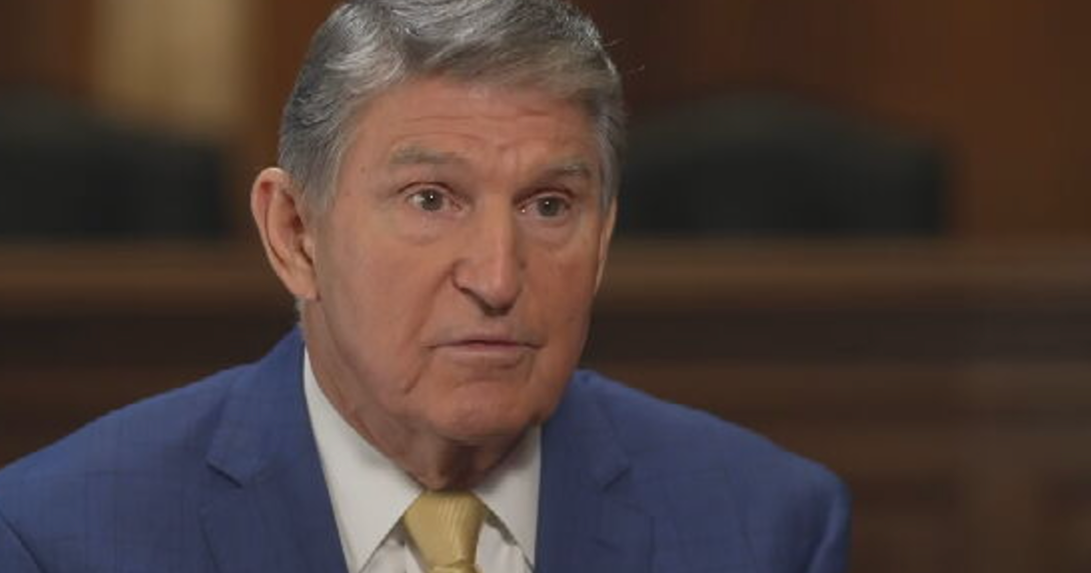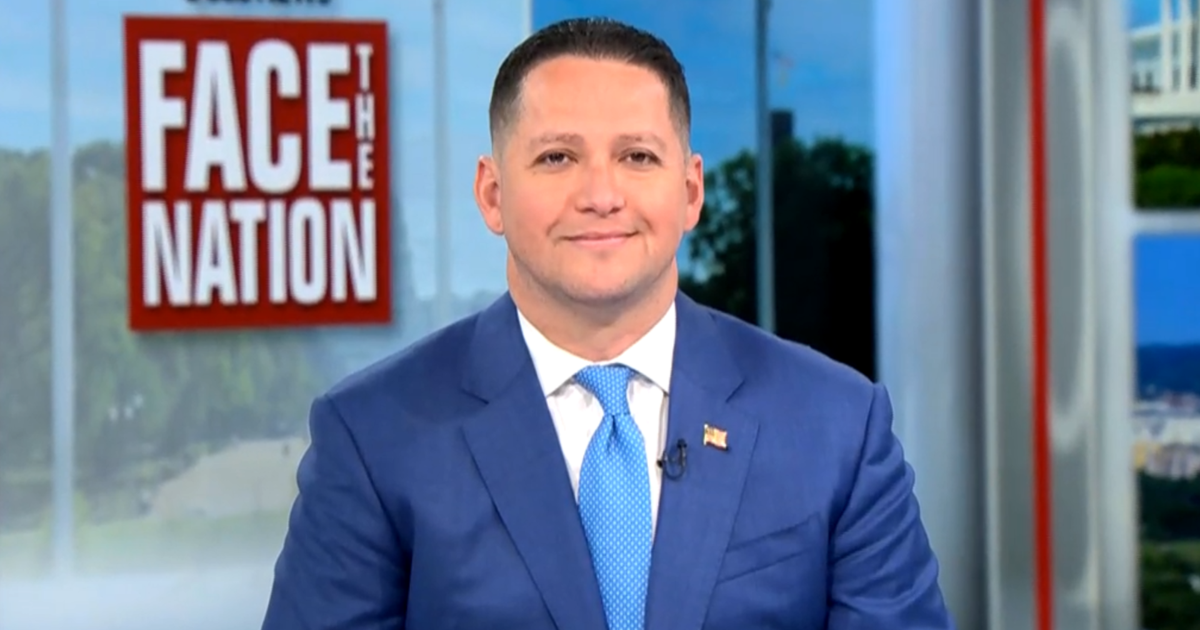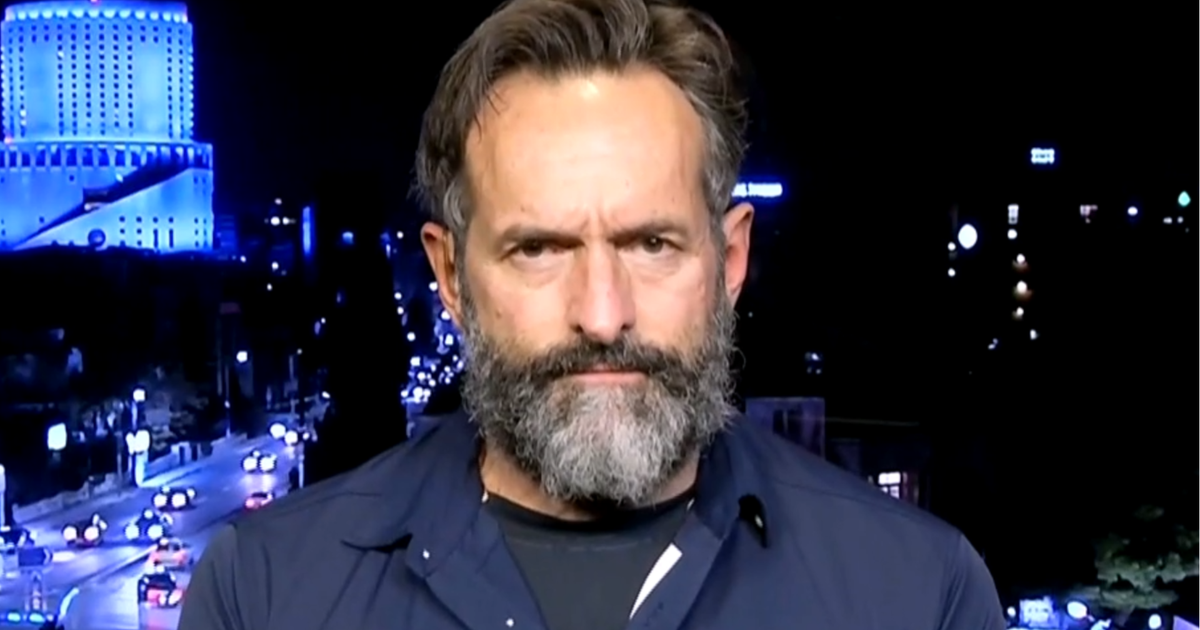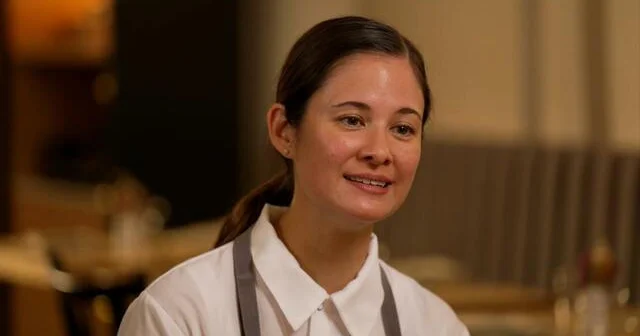CBS News
The Dish: Western restaurants – CBS News

Watch CBS News
Be the first to know
Get browser notifications for breaking news, live events, and exclusive reporting.
CBS News
Sen. Joe Manchin on his time in the Senate and what the future holds

Sen. Joe Manchin hasn’t quite figured out what he’ll do next once he leaves the Senate next month.
But whatever his future holds, he plans to keep hosting his former colleagues Congress on his popular houseboat in West Virginia. Manchin has for years hosted politicians of both parties aboard the “Almost Heaven,” which has been docked in Washington, his way of bringing his colleagues on both sides of the aisle together.
“I’m going to be involved,” Manchin told CBS News’ “Face the Nation with Margaret Brennan.” “The boat’s staying here.”
Manchin, who mulled an independent presidential bid this year, said he would have “loved to have had a platform” to speak centrist common sense, as he put it.
He expressed hope for President-elect Donald Trump’s success — despite previously saying that electing Trump would be “very detrimental” to the country. Manchin has said the rioting at the Capitol on Jan. 6, 2021, was a “bridge too far” for him.
“When the people speak and they make their choice and the election’s over, you better pray with everything you have the president will be successful,” Manchin told Brennan. “And if you’re in a position to help, you have knowledge of how the system works and can make it work, do it. … This is about our country, and I want him to succeed, and I have said this to him, I’ll do whatever I can to help in any way humanly possible.”
Manchin was West Virginia’s governor before he won his U.S. Senate seat in 2010. Since then, he’s tried to work with both parties. He formally left the Democratic Party in May, registering as an independent.
Manchin is still hoping to push a bill to ease the permitting process for the energy industry through Congress. He said he encouraged Trump to make it happen during a conversation at the Army-Navy game in Maryland last weekend.
His Energy Permitting Reform Act of 2024 would facilitate a faster permitting process for oil and natural gas, renewable energy, mineral mining and transmission lines. It hasn’t progressed in the Democratic-controlled Senate.
Manchin said he’s hoping Trump will watch his interview with “Face the Nation” and take a serious look at his bill.
“So now with this interview, I’m hoping, I’m asking President Trump to truly look at this permitting bill, because it is basically a good piece of legislation that we’ve never moved this far in a bipartisan way, with John Barrasso, going to be the No. 2 man in the Republican Senate, a good person, a good friend of mine,” Manchin told Brennan. “We worked hard and negotiated hard, and have a good bill. It’s ready to go. We have the bill ready. He could just drop it in.”
Manchin said he thinks Trump understands the political realities at play in Washington better than he did when he won in 2016. And the reality is that the Senate remains more independent than the House, he said.
“I think he understands it an awful lot better now than he did in 2016 when he won the first time,” Manchin said. “So now he’s got some experience under him. He understands the process, but he understands, also, the power that he’s wielding right now, the influence he has” with the House and Senate, which will be in Republican hands in January. Manchin wants to keep the filibuster in place; it requires most bills to reach a 60-vote threshold for consideration.
“I think there’s enough Republican senators and Democrat senators too, but Republicans have control because they’re the majority, that are not going to let the filibuster blow apart,” Manchin said. “… I don’t think they will do that. And it only takes five, or it takes four, I’m sorry, it takes four Republican senators, just four, and I guarantee you, I think there’s a lot more than four.”
Those Republicans, he said, will “protect the institution.”
“They’ve been here long enough,” Manchin said. “What goes around comes around, and in two years, this thing could flip — 2026, you never know. It’s the power of the people.”
contributed to this report.
CBS News
Rep. Tony Gonzales says “it feels as if Elon Musk is our prime minister” after funding chaos

Washington — Republican Rep. Tony Gonzales of Texas compared Elon Musk to an unelected prime minister after the Tesla CEO got involved in a tumultuous funding fight on Capitol Hill this week that prompted concern over a possible government shutdown — and previewed dynamics under a GOP-controlled Washington.
“We have a president, we have a vice president, we have a speaker. It feels as if Elon Musk is our prime minister,” Gonzales said on “Face the Nation with Margaret Brennan.”
After days of uncertainty, Congress approved a measure to keep the government funded until mid March, which President Biden signed Saturday to avert a shutdown. But the resolution came after multiple dashed attempts to fund the government, including a bipartisan deal scuttled following intense pushback from Musk, who President-elect Donald Trump has selected to lead a new agency called the Department of Government Efficiency or DOGE. After’s Musk’s criticism, Trump ultimately delievered the final blow.
Musk, who spent $277 million to help Trump win the election and has since become a key member of the president-elect’s brain trust, posted dozens of times on his social media platform X opposing the initial government funding measure following its release. Hours later, after Trump intervened, the deal was dead.
Gonzales, who was among 34 Republicans who opposed the final measure to keep the government funded, said he did so because his constituents were against the continuing resolution, or CR, “just as much as I was against the CR.”
“It was a vote on my end to say, let’s do our job,” he said, arguing that there’s a “sickness in DC” that won’t be cured by “big, long pork-filled bills.”
The Texas Republicans said he spoke with Musk a couple times during the week. And Gonzales argued that, although unelected, Musk has a voice that is in large part “a reflection of the voice of the people.” He also argued that Trump deserves credit for whittling the bill down from its initial form.
Meanwhile, the spending legislation, along with the ensuing chaos in the House, prompted intense criticism of House Speaker Mike Johnson for his handling of the situation. At least one Republican, Rep. Thomas Massie of Kentucky, said he wouldn’t support Johnson for speaker in the new Congress, while questions swirled about his ability to retain enough support to hold onto the gavel.
Despite his opposition to the legislation, Gonzales said he supports Johnson as speaker, arguing that “he’s done a fantastic job keeping us all together” and noting that “it’s like feral cats in the House.”
Gonzales said Johnson has “a tough job to begin with,” while adding that the speaker’s ability to work with the president-elect and Musk to find a solution “just goes to prove that he’s found a way.”
CBS News
Transcript: Roger Carstens on “Face the Nation with Margaret Brennan,” Dec. 22, 2024

The following is a transcript of an interview with Roger Carstens, special presidential envoy for hostage affairs, on “Face the Nation with Margaret Brennan” that aired on Dec. 22, 2024.
MARGARET BRENNAN: Roger Carstens is the Special Presidential Envoy for Hostage Affairs, and he joins us now from Amman, Jordan. This was a high risk visit to Damascus, the first since the Assad regime fell. Why was it important to be face to face and go there?
ROGER CARSTENS, SPECIAL PRESIDENTIAL ENVOY FOR HOSTAGE AFFAIRS: Margaret, thanks for having me on today. You know, I think it was important because we’ve been in the area since about the 9th of December, shortly after Damascus fell and the Assad regime left. We flew out to Beirut, later, we restaged to Amman, and our job’s been really to cast a wide net to work with partners, allies, NGOs, and even members of the media to try to cast this wide net to search for places that we believe Austin Tice may have been held over the last 12 years. But there’s something about getting face to face with the people that have been searching and certainly something about getting face to face with the interim authorities to determine what’s seen, to what extent has it- have these sites been cleared, and to maybe find bits of information that you’re just not going to get over a phone or over email.
MARGARET BRENNAN: You told reporters that you were amazed at the number of secret prisons that Bashar al-Assad had, more than 40 of them. Have those prisons been searched yet, and do you know if journalist Austin Tice was held in them?
AMB. CARSTENS: So it’s not going to shock me to find out that there are prisons that have yet to be discovered and searched. I think obviously a lot of them have been, not only by members of the general public, but also by members of this conglomerate of people that are on the hunt and search for not only Austin Tice, but people like Majd Kamalmaz, and other Americans that have gone missing. So if another, I would say, underground prison compound’s discovered even tomorrow or three days from now or three weeks from now, at this point, I’m not gonna be shocked. I would say if I’m stunned by anything, it’s just the amount of prisons. I mean, you’d almost think that if you were running a country and you wanted to jail your enemies, you’d have one prison, and it wouldn’t be secret. But to have like 35 or 40 secret prisons, I find that just horrifying, disturbing, and yet in a way fascinating. But really the bottom line is that we have to help, and- or rather work with our interim authorities, officials, to make sure that we do a good search so that I can one day look Debra Tice in the eyes and tell them that our search been- has been exhaustive. Now in a perfect world, we’re gonna find Austin Tice. I think I’ve gone on record numerous times saying that I believe that he’s alive and he’s waiting for me to find him. And the president not long ago said that he believes Austin’s alive. Our job in the U.S. government is to keep pressing and pressing and pressing to find out Austin’s location, his disposition, his status, and to bring him home.
MARGARET BRENNAN: You’re referring to them as interim authorities. Ahmed al-Sharaa, the head of HTS, also known as Mohammad al-Jolani, was described by State Department officials as being “very pragmatic” in those meetings today, but his group and he himself are still technically designated as terrorists under U.S. law because of prior affiliation with Al Qaeda. Do you trust that they are being helpful to the U.S. now?
AMB. CARSTENS: So Margaret, I’m- I’m not one of the policy people that render some of these decisions, that’s done by people that spend years perfecting this. They’re- most of them are lawyers, and I wasn’t smart enough to get a law degree. But what I can tell you is that they’ve treated us well in terms of our search. I’ve been talking to them for, I wanna say almost, probably nine or 10 days, and they’ve been helpful in conducting the search. They were definitely helpful today. We conducted a joint search of a facility that we- we all thought would have a probable, I guess, have some sort of relation to Austin Tice. So I understand, of course their- their past. What I can tell you right- is that right now they’re being helpful in the search for Austin.
MARGARET BRENNAN: So you conducted a joint search with HTS of a prison today. Did you believe that that is where Austin was being held?
AMB. CARSTENS: You know, Margaret, we had a lot of information over the last 12 years that pointed to a variety of facilities. And in necking that down over 12 years, we came up with a priority list of about six sites and of those six sites, we felt that this had the highest probability of having held Austin at one time. But really the long- the- I guess I would say the best way to describe it is, we’re just not sure. You know, you can get information from Syria, which to an extent has been a black box in terms of gathering information on Austin, and with all the things, all the, I guess I’d say reports being overlaid, it becomes clear that some places have a higher probability than others. And this, with the time that we had in the ground, seemed to be our best shot. So we- we gave it a good, hard look. We’re gonna review all the information and evidence that we collected and hopefully render some more decisions about the probability, but really, our- our job is to just keep searching. You know, it- sometimes it takes a while to determine whether the information is valid or not. And when we g- go to the hard work of crosschecking it, but out of all the sites that we could have looked at, out of the 40 or so prisons that we’ve identified, and out of the six priority prisons, we went to the one that we felt had the highest chance of giving us some sort of evidence that Austin had been there.
MARGARET BRENNAN: The Assad intelligence ministries were known for keeping scrupulously detailed records, numbering prison- prisoners, alive and dead. Do those records still exist? Have you gone through them to look for evidence of Austin and the Virginia doctor you mentioned, Majd Kamalmaz?
AMB. CARSTENS: So we’ve had a chance to find various documents, or I would even say file folders, holding information. Again, in the joint search that we conducted with interim authorities today, we came across numerous documents. That’s gonna have to be brought back. It’s gonna have to be translated from Arabic into English. And sometimes these documents will actually have evidence on them. They may have fingerprints, they may have traces of DNA. So we’re still in the, I would say the research phase, but the bottom line is we did find some documents. We’re taking a hard look at them.
MARGARET BRENNAN: And this was a search you conducted along with special operators from JSOC?
AMB. CARSTENS: I would never go into talking about who I was with, but I will tell you this. I was with members of the FBI. The hostage recovery fusion cell holds primacy on these cases. My office SPEHA is involved because of the diplomatic angle and aspect. So today on the ground, we were working with members of the Federal Bureau of Investigation, people that are experts at looking at crime scenes, and they did a wonderful job of sweeping it, using all their skills, talents, and capabilities to bear, to- to find the right documents that might make sense to gather the evidence that they felt might give us a- more certainty. But that’s- I’ll probably just leave it at that. We were with members of the- the law enforcement community, the FBI, and I think they- they were the ones that were able to give us this good look that we otherwise would not have.
MARGARET BRENNAN: Debra Tice, Austin’s mother, sent a letter that became public to the Israeli prime minister, asking him to have his military stop bombing prisons, because she believed her son might be in one of them. Has that bombing complicated the search?
AMB. CARSTENS: I would say, to the extent that- of knowledge that I have, no. Now I may not have full- a full picture. You talked earlier about the dis- or the difference between being in Beirut and talking to people on the phones and sending texts, WhatsApp, Signal messages, or being in Amman and doing the same. When you get on the ground and get face to face, you’re able to suck in or vacuum in a lot more information. From the information that I’ve received, the bombing has not really impeded any of the search efforts for Austin. However, I would not want to be too firm about that because there are bits of information that I may not have.
MARGARET BRENNAN: This wasn’t your first trip to Damascus. I know back in 2020, you went there at the direction of then president Donald Trump- Trump, along with Kash Patel. The regime at that time never admitted to the United States that they held Austin Tice. Do you believe they were lying back then, and that the regime did have him?
AMB. CARSTENS: Well, what I can tell you is that the regime, when we talked to them in- in 2020, they issued maximalist demands. They- they asked for the world. They weren’t really giving anything. They never admitted to having Austin Tice. They never promised to give us any proof of life, POL, as we call it. They essentially asked for a lot and said, if we’re- the United States were able to deliver everything, they might be willing to have a discussion about this- this person that we’re asking about, or to discuss our interests. At that time, they wouldn’t even mention his name. So they were not- they were asking for a lot and giving pretty much nothing, and it made for the conversations very frustrating. I would say that at some point we came across information and that’s- as highlighted by President Biden and Secretary of State Tony Blinken, that led us to believe that at one point, the Syrian government truly did have Austin Tice. Did they- did they have him until the very end? That’s information we’re still trying to sort through. But at one point we- we feel very confident that the regime did detain and have Austin Tice in their custody.
MARGARET BRENNAN: And before I let you go, the family of Dr. Majd Kamalmaz was told by U.S. intelligence that their father likely died when he was in captivity. Is there a reason for them to continue to hope? Did you discover anything about him?
AMB. CARSTENS: I would say that if I were in their shoes, I would always want to press to- until I get something that’s very conclusive. And my role is- being a part of the U.S. government, my job is to pursue- pursue as rigorously as I can, the truth. And my- I would probably tell the family, and I actually have, I- I’ve met the family numerous times, I’ve been in their homes, I’ve had a chance to- to break bread with them. And I always tell them, no matter what the status is of Majd, we’re bringing him home one day. I think if I was in the family’s shoes, I’d always have a hope that he was alive. I think the U.S. government’s been firm, at least on the information that they’ve been able to provide about his status. But regardless, we’re gonna keep pursuing Majd’s case. And one day, at some point, I think we’re gonna be able to put that to rest and bring him home.
MARGARET BRENNAN: Roger Carstens. I know it’s been an extremely long day and an extremely long effort. Thank you for sharing details with us.
AMB. CARSTENS: Margaret. Thanks for having me on.
MARGARET BRENNAN: “Face the Nation” will be back in one minute. Stay with us.







